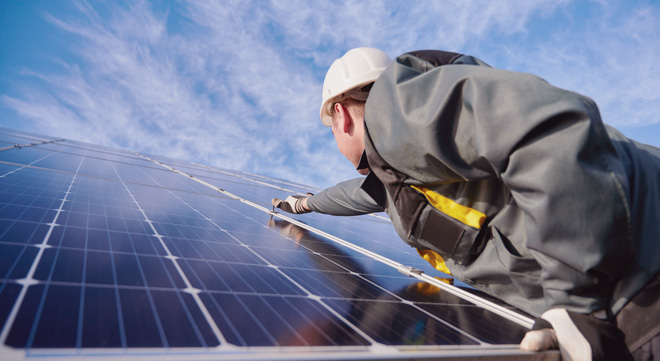With South Africa just having come off the back of Stage 6 loadshedding, many households and businesses are eager to hear whether the sunset date for the renewable energy tax breaks will be extended.
Minister of Finance Enoch Godongwana will present the Budget on Wednesday, 21 February. Among the many complex challenges that will, hopefully, be addressed, is whether the renewable energy rebates, first introduced in last year’s Budget, will continue.
In the 2023 Budget, the lack of a reliable electricity supply was highlighted as the country’s biggest economic constraint. To encourage businesses and individuals to invest in renewable energy and to increase electricity generation, the government announced two tax measures. The first provided R5 billion in tax relief to companies through an expansion of the renewable energy incentive, and the second provided R4bn in tax relief for households that install solar panels.
Both entail several conditions and requirements, as well as tight timelines.
Read: Treasury clarifies aspects of the renewable energy tax incentive for businesses
Read: A deeper look at the solar panel tax incentive for individuals
According to Marle van Niekerk, the director of personal income tax at National Treasury, the tax incentives aimed to encourage households and businesses to install solar photovoltaic (PV) systems and other renewable energy sources to reduce their dependence on Eskom and to ameliorate the impact of loadshedding.
Individuals can claim 25% in tax deductions on the cost of installing solar PV rooftop panels, with this capped at R15 000 for one year, effective from 1 March 2023.
To qualify for the rebate, individuals need to have a Certificate of Compliance evidencing that the solar PV panels were brought into use for the first time in the period from 1 March 2023 to 29 February 2024.
Businesses registered for corporate income tax and sole proprietors and other taxpayers conducting business activities can deduct 125% of the cost of assets that produce renewable energy. This temporary incentive is only available for two years from 1 March 2023 until and including 28 February 2025.
According to the government, the incentive’s temporary nature aims to encourage businesses to respond sooner by investing in assets used for renewable energy production.
Initially, most stakeholders backed the roll-out of rooftop solar incentives for individuals. But concerns emerged about the exclusion of essential components, such as batteries, and the perceived inadequacy of the maximum rebate of R15 000. It was stated that these limitations would significantly curb the effectiveness of the tax incentive. Additionally, there were suggestions to extend the incentive for households beyond one year.
Calls were also made to extend the two-year period for businesses, with commentators highlighting concerns that the timeframe could exclude numerous large projects currently in progress. They added that regulatory approval delays had significantly impacted project timelines.
Treasury officials addressing the Standing Committee on Finance (Scof) in October last year said they would not expand the tax incentive for households to include batteries and inverters, nor would the incentive be extended beyond a year.
At the time, Treasury explained that although an inverter and batteries were required to use solar panels, they could be operated without solar panels – in which case they provided no additional capacity to the system.
Van Niekerk told Scof that the reason for the latter decision was because it would have implications for the fiscus.
Treasury also rejected calls for the two-year period to be extended for business.
The reasons given for not extending the period included that the purpose of the incentive was to change behaviour and encourage as many businesses as possible to invest in renewable energy generation capacity as soon as possible – that is, to accelerate investment within a “constrained fiscal envelope”.
However, when briefing the nation about progress made in implementing the Energy Action Plan in November last year, Electricity Minister Kgosientsho Ramokgopa said the government’s solar panel subsidy has been well received.
ITWeb reported that, according to Ramokgopa, the government had set its sights on expanding the rollout of rooftop solar to more households.
The minister highlighted the need to expand the incentives beyond solar PV panels to include batteries and inverters, and he advocated for extending these incentives from one year to three or five years.
But his voice is just one among many opposing voices from those in power.
A tax specialist’s view
Weighing in on the future of tax incentives for renewable energy sources, Mahomed Kamdar, a tax specialist at the South African Institute of Professional Accountants (SAIPA), says it’s been interesting to see the rationale behind the differing timelines for households and businesses to take advantage of the tax incentives for renewable energy.
“The urgency for households to act quickly makes sense considering the relatively simple setup required for rooftop solar panels and the government’s push to alleviate the strain of loadshedding,” he says.
Kamdar believes the potential extension of the deadline reflects a pragmatic response to ongoing challenges, demonstrating a willingness to adapt policies to serve citizens’ needs better.
“So, we can expect changes to the timeframe.”
He says businesses face a different set of circumstances, with larger investments and more complex infrastructure needed for renewable energy projects such as wind and hydropower. He says the two-year timeline acknowledges the realities of planning, permitting, and construction involved in these endeavours.
“If the situation of loadshedding persists in such a severe and disruptive manner, it’s reasonable to anticipate adjustments to the deadlines for both households and businesses to take advantage of tax incentives for renewable energy adoption,” Kamdar predicts.
To find out which way the pendulum swings, South Africans will need to switch on their TV screens on Wednesday – that is, if loadshedding allows.



